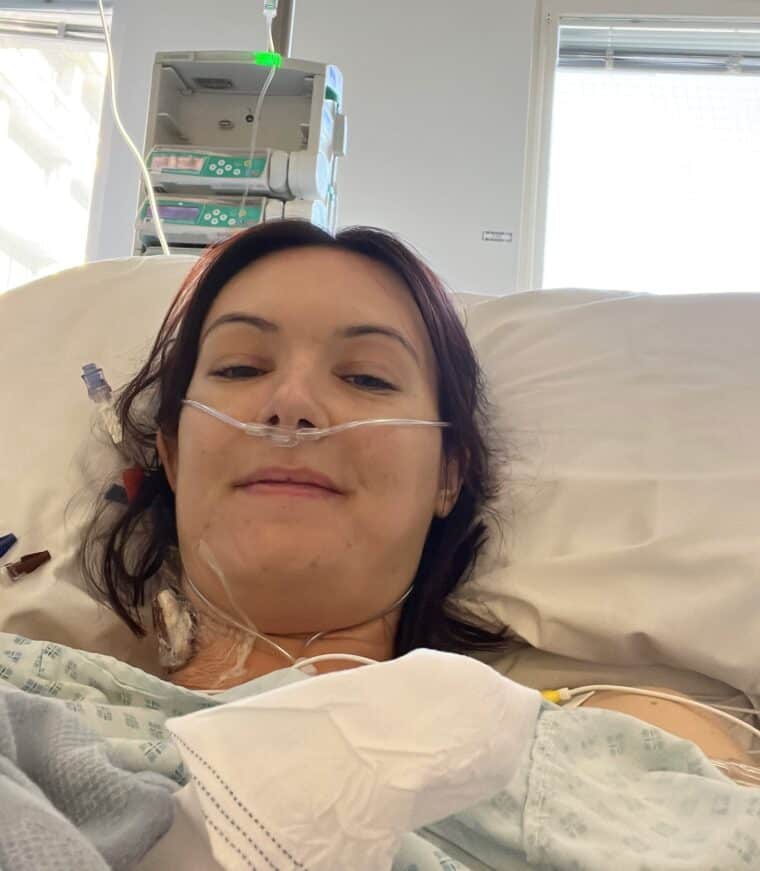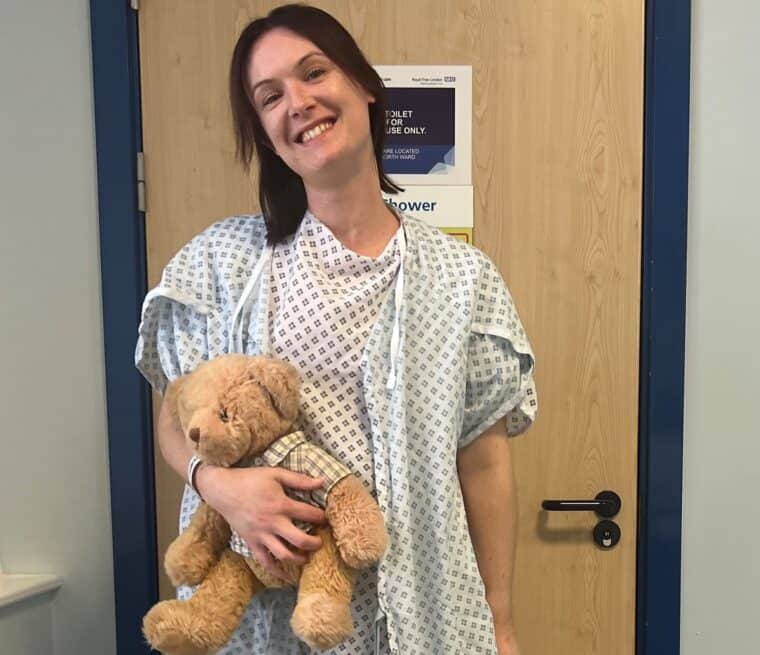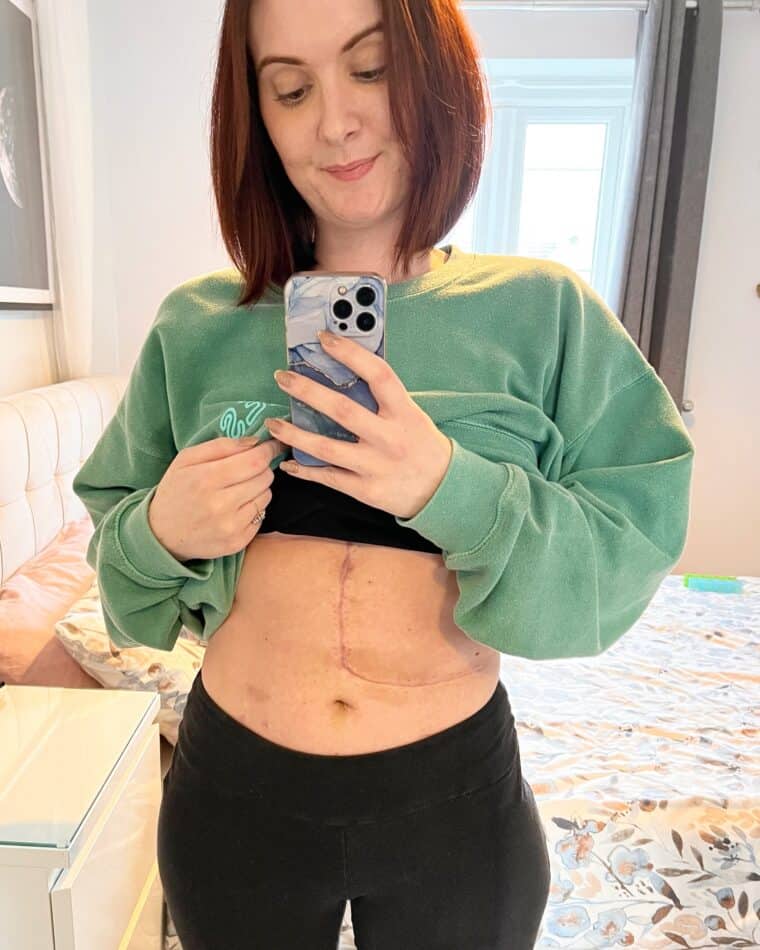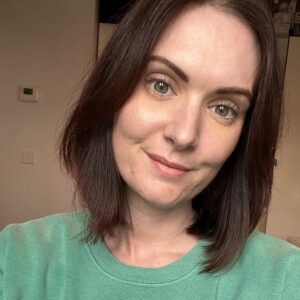“During Covid I went through every single emotion. It was really hard when the transplant list was shut down because I’d been told I was a priority and because I was vulnerable, I was too frightened to go anywhere and almost became a recluse. To keep me safer my scans were moved to a private hospital, but I was still anxious about getting Covid.
Having cancer was so scary and by February 2021 I was overwhelmed, really down and responding very emotionally to everything. I was approaching two years on the transplant list and hadn’t had a call, while everybody else in the support groups was having their transplants. I felt forgotten about and wondered what the point was of being on the list. One day I left all the Facebook support groups because they were making me worse and got very close to taking myself off the list just to have some piece of mind.
I got the call the next day.
My hospital in Birmingham had been one of the worst places affected by Covid, so they had temporarily transferred their urgent patients. I was sent to the Royal Free in London and that’s where the call came from. I panicked and was so scared because I’d never been there before or met any of the medical team, so when I was told the transplant wasn’t going ahead, I had a weird feeling of relief.
After two weeks I calmed down, but then cried when I was moved back to Birmingham. The Royal Free had been so attentive – they kept ringing me to make sure I was OK and to reassure me they were doing their best to get me the transplant. I thought I would be forgotten about now – that wasn’t the case, but it felt that way. I longed for that second call.

At the beginning of September I was told Birmingham were still really struggling with their ICU capacity and would be moving some patients to the Royal Free and Newcastle because they’d have a better chance of getting a transplant there. I jumped at the chance.
I had a great doctor at the Royal Free and the transplant coordinators rang me a lot, saying how much they wanted me to get a transplant. However, even though I was still really poorly and my quality of life was poor I was rock bottom in terms of priority because the Sabre treatment had killed my tumours. So my consultant appealed to put me on the variant list and I was approved at the beginning of August and put near the top of that list because it’s based on how long you’ve been waiting. I think it was because of my portal hypertension and severe side effects – I had varices banded every six months and bleeds and all sorts.
My second and final call came on November 1st at 2am and I was in surgery by 11am. I was super, super happy because I’d been preparing myself for it to be a false call and so calm going down to surgery. I woke up feeling the exact same way. I’m not a religious or spiritual person, but I really felt like someone was protecting me.
I experienced rejection straight away after the liver transplant but I knew from the British Liver Trust’s support groups that this is common and very easily controlled
When I woke up I was obviously in a lot of pain, but the severe pains I used to have didn’t exist anymore. I experienced rejection straight away, my bilirubin was high and I was yellow within two days. I knew from the British Liver Trust’s support groups that rejection is common and very easily controlled – the meds just need to be adjusted. I was told it was because of my age (31), but I wasn’t panicked by it because everything else was going so well. It was treated and there were no other problems.
The size of my spleen went down by 5cm in the first two weeks and now I only experience pain if I overeat. That’s only happened twice. Before I had to eat every two or three hours to keep my sugar up, avoid certain foods and take loads of laxatives. I don’t need to do that anymore. I’ve lost two stone and my weight is stable.
I did end up back in hospital at Christmas because of a problem with one of my arteries, but it’s stable and being monitored. I also had CMV (cytomegalovirus – an infection that can be passed from donor to recipient) twice and only just got rid of it in March. I’ve never been exposed to it before, most of the population has, otherwise I would have had some resistance. It was tough, it makes you tired and gives you severe diarrhoea and stomach pain, dizziness and sickness. The hospital kept an eye on me and gave me extra appointments, but I’m negative now so hopefully it will stay away.
I’m pretty much back at my pre-transplant level of fitness now, maybe a little bit further. Before when I was quite poorly I would try to walk one kilometre a day and now, just four months post-transplant, I can do that again and it feels so much easier. The most I’ve walked in one go is just over 2k which is incredible considering it took me nearly three-and-a-half years to get past one kilometre.
My liver disease was essentially cured by this transplant, albeit leaving me with other conditions, like being immunosuppressed. I still have a bit of fatigue, but everything else is fine.

I lost a lot of my childhood and youth to being sick, so a big chunk of my life is gone. I’d gradually been getting better until the age of 22, but when everything collapsed I was just trying to get through it, so it feels like it’s gone so fast. But I do also think it’s made me a better person and changed my outlook on what is actually important rather than people think is important. So I’m grateful that I think in the way I do now.
I’m a massive advocate of therapy and getting anxiety under control and would advise everyone to at least try getting some counselling. I would also encourage people to use the British Liver Trust and its support groups. They are full of laughter and everyone is so caring and open. I recommend the transplant community on Instagram too. I’ve made so many friends and had so many messages through my transplant that made me feel so cared for and loved. I don’t think I would have been as positive without them. Sometimes you don’t know whether things are normal, but if you speak to someone who gets it, you feel less alone.
Before the transplant I was training to be a teacher and doing three to six hours a week of teaching which knocked me out. I graduated in 2020 and then managed to teach three hours a week remotely, but I was so tired all the time and last year was a lot worse. I’m now on the lookout for a part-time teaching job and can’t wait.
My parents are so happy now – I can’t even fathom how scared they must have been when I was ill as a child. My mum’s asked if she could write a little letter to my donor’s family – she’s just desperate to thank them. Everyone is still in disbelief at how much change there’s been in my body – I’m now a relatively normal person and am unbelievably thankful I’ve made it this far.”


